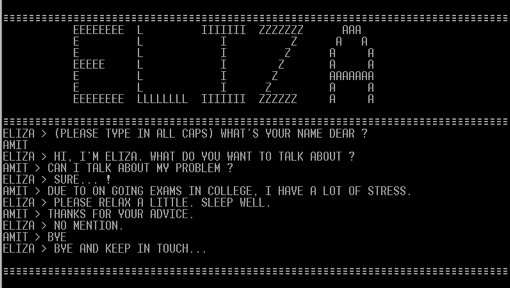While this ELIZA/DOCTOR program demonstrated failure in adhering to the objectives of my experiment, its utility is not limited to its achievement in substituting old media human interaction. For example, in her work, Life on the Screen, Sherry Turkle observes that advocates of ELIZA consider its value as “a kind of diary or mirror.” Additionally, Janet Murray considers the program as literary art that enables creative expression, rather than blemishing notions of humanity in the article, “Eliza’s Daughters.”
The New Media Reader textbook includes a segment in the chapter “Computer Power and Human Reason” that provides the input of ELIZA’s programmer, Joseph Weizenbaum, as he evaluates the implications of the system, intended to “be appreciated on some level by anyone. Its power as a demonstration vehicle was further enhanced by the fact that the visitor could actually participate in its operation.” Weizenbaum further addresses its receptivity, stating, “I was startled to see how quickly and how very deeply people conversing with DOCTOR became emotionally involved with the computer and how unequivocally they anthropomorphized it.” He also admits that the program does not attempt to offer any general solutions to problems it faces. Rather, its “language is understood only in contextual frameworks, that even these can be shared by people to only a limited extent, and that consequently even people are not embodiments of any such general solution.” This statement implies that humans may also be as unconstructive as ELIZA, though unlike these individuals, ELIZA calculatedly does not have the capacity to accommodate. In the course of his publication, Weizenbaum additionally reveals the program’s comedic implications, as it simulates the incompetence of therapists."

No comments:
Post a Comment